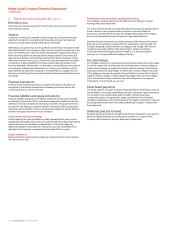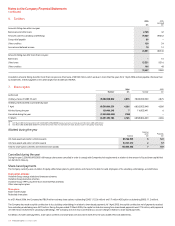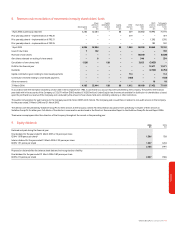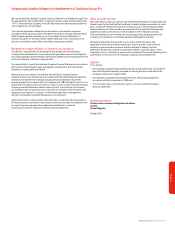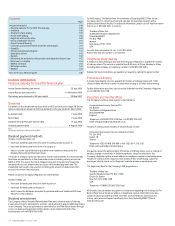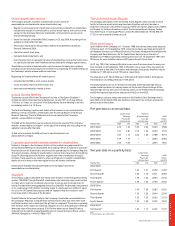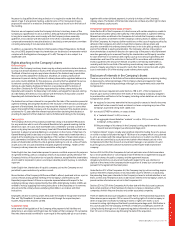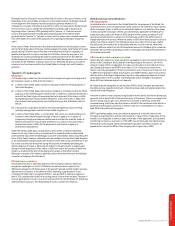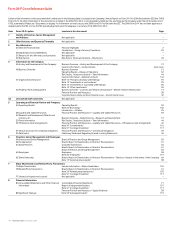Vodafone 2006 Annual Report Download - page 146
Download and view the complete annual report
Please find page 146 of the 2006 Vodafone annual report below. You can navigate through the pages in the report by either clicking on the pages listed below, or by using the keyword search tool below to find specific information within the annual report.144 Vodafone Group Plc Annual Report 2006
Investor information
continued
The City Code on Takeovers and Mergers also contains strict disclosure requirements on
all parties to a takeover with regard to dealings in the securities of an offeror or offeree
company and also on their respective associates during the course of an offer period.
General meetings and notices
Annual general meetings are held at such times and place as determined by the
directors of the Company. The directors may also, when they think fit, convene an
extraordinary general meeting of the Company. Extraordinary general meetings may
also be convened on requisition as provided by the Companies Act.
An annual general meeting and an extraordinary general meeting called for the passing
of a special resolution need to be called by not less than twenty-one days’ notice in
writing and all other extraordinary general meetings by not less than fourteen days’
notice in writing. The directors may determine that persons entitled to receive notices of
meetings are those persons entered on the register at the close of business on a day
determined by the directors but not later than twenty-one days before the date the
relevant notice is sent. The notice may also specify the record date, which shall not be
more than forty-eight hours before the time fixed for the meeting.
Shareholders must provide the Company with an address or (so far as the Companies Act
allows) an electronic address or fax number in the United Kingdom in order to be entitled
to receive notices of shareholders’ meetings and other notices and documents. In certain
circumstances, the Company may give notices to shareholders by advertisement in
newspapers in the United Kingdom. Holders of the Company’s ADSs are entitled to
receive notices under the terms of the Deposit Agreement relating to the ADSs.
Under Section 366 of the Companies Act 1985 and the Company’s Articles of
Association, the annual general meeting of shareholders must be held each calendar
year with no more than fifteen months elapsing since the date of the preceding annual
general meeting.
Variation of rights
If, at any time, the Company’s share capital is divided into different classes of shares, the
rights attached to any class may be varied, subject to the provisions of the Companies
Act, either with the consent in writing of the holders of three fourths in nominal value of
the shares of that class or upon the adoption of an extraordinary resolution passed at a
separate meeting of the holders of the shares of that class.
At every such separate meeting, all of the provisions of the Articles of Association
relating to proceedings at a general meeting apply, except that (a) the quorum is to be
the number of persons (which must be at least two) who hold or represent by proxy not
less than one-third in nominal value of the issued shares of the class or, if such quorum
is not present on an adjourned meeting, one person who holds shares of the class
regardless of the number of shares he holds, (b) any person present in person or by
proxy may demand a poll, and (c) each shareholder will have one vote per share held in
that particular class in the event a poll is taken.
Class rights are deemed not to have been varied by the creation or issue of new shares
ranking equally with or subsequent to that class of shares in sharing in profits or assets
of the Company or by a redemption or repurchase of the shares by the Company.
Limitations on voting and shareholding
There are no limitations imposed by English law or the Company’s Articles of Association
on the right of non-residents or foreign persons to hold or vote the Company’s shares
other than those limitations that would generally apply to all of the shareholders.
Documents on display
The Company is subject to the information requirements of the US Securities and
Exchange Act of 1934 applicable to foreign private issuers. In accordance with these
requirements, the Company files its Annual Report on Form 20-F and other related
documents with the SEC. These documents may be inspected at the SEC’s public
reference rooms located at 450 Fifth Street, NW Washington, DC 20549. Information on
the operation of the public reference room can be obtained in the US by calling the SEC
on +1-800-SEC-0330. In addition, some of the Company’s SEC filings, including all those
filed on or after 4 November 2002, are available on the SEC’s website at www.sec.gov.
Shareholders can also obtain copies of the Company’s Memorandum and Articles of
Association from the Vodafone website at www.vodafone.com or from the Company’s
registered office.
Material contracts
At the date of this Annual Report, the Group is not party to any contracts that are
considered material to the Group’s results or operations, except for its $10.9 billion credit
facilities which are discussed under “Financial Position and Resources – Liquidity and
Cash Resources”.
Exchange controls
There are no UK government laws, decrees or regulations that restrict or affect the
export or import of capital, including but not limited to, foreign exchange controls on
remittance of dividends on the ordinary shares or on the conduct of the Group’s
operations, except as otherwise set out under “Taxation” below.
Taxation
As this is a complex area, investors should consult their own tax adviser regarding the US
federal, state and local, the UK and other tax consequences of owning and disposing of
shares and ADSs in their particular circumstances.
This section describes for a US holder (as defined below), in general terms, the principal
US federal income tax and UK tax consequences of owning shares or ADSs in the
Company as capital assets (for US and UK tax purposes). This section does not, however,
cover the tax consequences for members of certain classes of holders subject to special
rules and holders that, directly or indirectly, hold 10 per cent or more of the Company’s
voting stock.
A US holder is a beneficial owner of shares or ADSs that is for US federal income tax
purposes:
(i) a citizen or resident of the United States;
(ii) a US domestic corporation;
(iii) an estate the income of which is subject to US federal income tax regardless of its
source; or
(iv) a trust if a US court can exercise primary supervision over the trust’s administration
and one or more US persons are authorised to control all substantial decisions of
the trust.
This section is based on the Internal Revenue Code of 1986, as amended, its legislative
history, existing and proposed regulations thereunder, published rulings and court
decisions, and on the tax laws of the United Kingdom and the Double Taxation
Convention between the United States and the United Kingdom (the “Treaty”), all as
currently in effect. These laws are subject to change, possibly on a retroactive basis.
This section is further based in part upon the representations of the Depositary and
assumes that each obligation in the Deposit Agreement and any related agreement will
be performed in accordance with its terms.
Based on this assumption, for purposes of the Treaty and the US-UK double taxation
convention relating to estate and gift taxes (the “Estate Tax Convention”), and for US
federal income tax and UK tax purposes, a holder of ADRs evidencing ADSs will be
treated as the owner of the shares in the Company represented by those ADSs.
Generally, exchanges of shares for ADRs, and ADRs for shares, will not be subject to US
federal income tax or to UK tax, other than stamp duty or stamp duty reserve tax (see
the section on these taxes below).
Taxation of dividends
UK taxation
Under current UK tax law, no withholding tax will be deducted from dividends paid by
the Company.
A shareholder that is a company resident for UK tax purposes in the United Kingdom will
not be taxable on a dividend it receives from the Company. A shareholder in the
Company who is an individual resident for UK tax purposes in the United Kingdom is
entitled, in calculating their liability to UK income tax, to a tax credit on cash dividends
paid on shares in the Company or ADSs, and the tax credit is equal to one-ninth of the
cash dividend.
US federal income taxation
A US holder is subject to US federal income taxation on the gross amount of any
dividend paid by the Company out of its current or accumulated earnings and profits (as
determined for US federal income tax purposes). Dividends paid to a non-corporate US
holder in tax years beginning before 1 January 2009 that constitute qualified dividend
income will be taxable to the holder at a maximum tax rate of 15%, provided that the
ordinary shares or ADSs are held for more than 60 days during the 121 day period
beginning 60 days before the ex-dividend date and the holder meets other holding
period requirements. Dividends paid by the Company with respect to the shares or ADSs
will generally be qualified dividend income.
A US holder is not subject to a UK withholding tax. The US holder includes in gross
income for US federal income tax purposes only the amount of the dividend actually
received from the Company, and the receipt of a dividend does not entitle the US holder
to a foreign tax credit.


